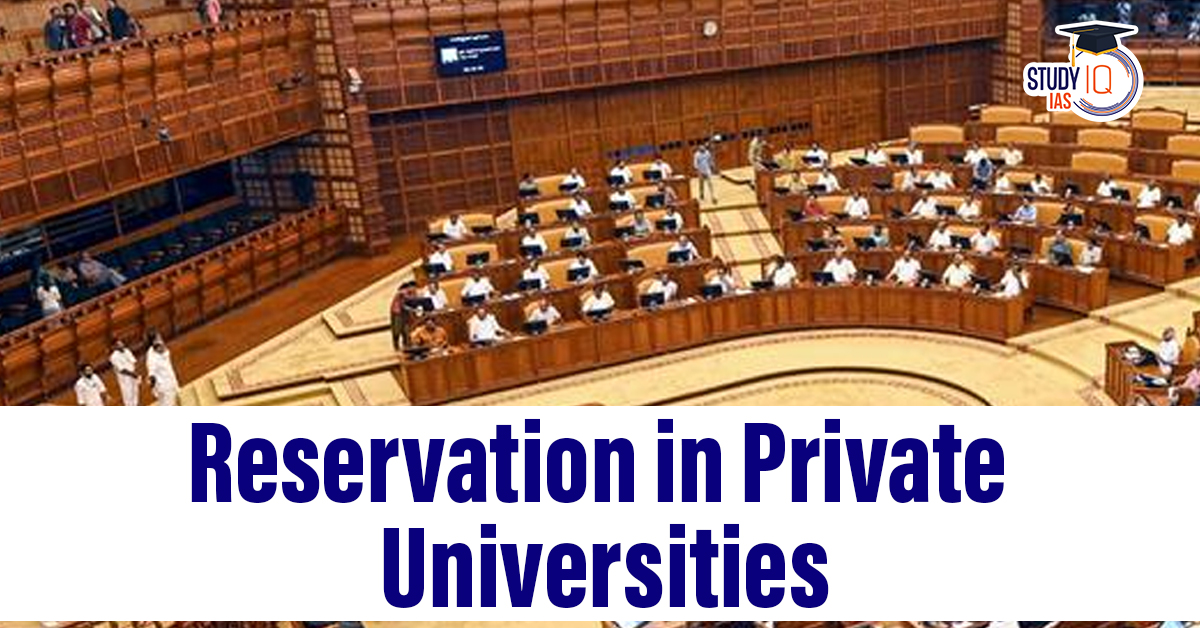Table of Contents
Context: The concept of implementing reservation in private universities and colleges is long overdue.
Why Reservation in Private Universities/Higher Educational Institutions (PHEIs) Is Needed?
- To Address Deepening Educational Inequality: Higher education has become a tool for “effectively maintained inequality”, where upper-caste and upper-class groups preserve their dominance even as access expands.
- Privatization Has Created an Exclusive Space: The elite are migrating to private institutions that offer better infrastructure and faculty, while public institutions are left overcrowded and underfunded.
- Existing Inequality in Access: Marginalized groups (SCs, STs, OBCs, Muslims) are grossly underrepresented in private universities:
- SCs: 8% (vs ~17% population)
- STs: 6% (vs ~9%)
- OBCs: 9% (vs ~45-50%)
- Muslims: 8% (vs ~15%)
- In contrast, upper-caste Hindus (~20% population) form over 60% of private university students.
- Public Institutions Are Overburdened and Undervalued: Public HEIs, which follow reservation norms, are overcrowded, underfunded, and understaffed.
- They are increasingly perceived as sites for “time pass”, lacking quality and job prospects.
- Reservation Works Where Implemented: In public universities (where reservation is mandatory), representation is significantly higher:
- SCs: 14.6%
- STs: 6%
- OBCs: 31.2%
- This shows that quota-based affirmative action is effective.
- Legal Backing Already Exists: The 93rd Constitutional Amendment (Article 15(5)) and subsequent Supreme Court verdicts (2011, 2014) have cleared the way for reservation in unaided private institutions, making implementation legally permissible.
| Note |
Private Higher Educational Institutions (PHEIs) include:
|
Legal Framework Supporting Reservation in Private Higher Educational Institutions (PHEIs)
93rd Constitutional Amendment (2005)
- Added Article 15(5).
- Allows the state to make special provisions for SCs, STs, and OBCs in private educational institutions (except minority institutions).
Central Educational Institutions (Reservation in Admission) Act, 2006
Provided for OBC reservation but limited to central educational institutions.
Supreme Court Judgments
- Ashok Kumar Thakur vs Union of India (2008): Upheld OBC reservation in state-run/state-aided institutions.
- IMA vs Union of India (2011): Two-judge bench upheld reservation in unaided private institutions.
- Pramati Educational and Cultural Trust vs Union of India (2014): Five-judge bench reaffirmed the above.
What Must Be Done?
Strengthen Public Higher Education Institutions (HEIs)
Increase funding to public colleges and universities.
- Fill regular faculty vacancies.
- Ensure professional autonomy and updated curricula.
- Improve infrastructure and governance.
Implement Reservations in Private HEIs
- Enforce national reservation policy (for SCs, STs, and OBCs) in private institutions, both aided and unaided.
- Ensure compliance through regulatory mandates and legislative action.
Mandate Freeships and Scholarships
- Private HEIs should be required to offer a certain proportion of freeships and scholarships to students from marginalized communities.
- This would make quality education more accessible and inclusive.
Utilize Legal Backing
- Leverage the 93rd Constitutional Amendment (Article 15(5)) which allows for reservation in private educational institutions (excluding minority institutions).
- Refer to Supreme Court judgments (2011, 2014) that have upheld the legality of such reservations.
Political Will and Action
Bring the issue to the centre of political discourse.
- Mobilize public opinion and build consensus among political parties.
- Push for policy implementation through party manifestos, parliamentary debates, and public statements.
Address Inequality in Access
- Bridge the growing divide between elite private institutions and overcrowded, underfunded public institutions.
- Ensure historically marginalized communities can access quality education and employment opportunities.
Conclusion
Given legal sanction, long-standing political support, and the increasing dominance of private HEIs, reservation in private universities and colleges was long overdue to ensure real, effective social justice in education.


 Research Infrastructure in India for its...
Research Infrastructure in India for its...
 Maternal Mortality Rate in India, State ...
Maternal Mortality Rate in India, State ...
 Police Torture and Unaccountability in I...
Police Torture and Unaccountability in I...





















